 MyDogBreeds
MyDogBreeds Manchester Terrier is originated from United Kingdom but Basque Shepherd is originated from Spain. Manchester Terrier may grow 31 cm / 12 inches shorter than Basque Shepherd. Manchester Terrier may weigh 25 kg / 55 pounds lesser than Basque Shepherd. Both Manchester Terrier and Basque Shepherd has same life span. Manchester Terrier may have less litter size than Basque Shepherd. Manchester Terrier requires Low maintenance. But Basque Shepherd requires Moderate maintenance
Manchester Terrier is originated from United Kingdom but Basque Shepherd is originated from Spain. Manchester Terrier may grow 31 cm / 12 inches shorter than Basque Shepherd. Manchester Terrier may weigh 25 kg / 55 pounds lesser than Basque Shepherd. Both Manchester Terrier and Basque Shepherd has same life span. Manchester Terrier may have less litter size than Basque Shepherd. Manchester Terrier requires Low maintenance. But Basque Shepherd requires Moderate maintenance
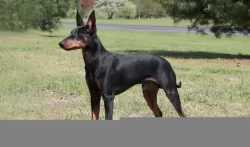 Looking much like the Black and Tan Terrier, the Manchester Terrier is a dog that was actually developed from the Black and Tan, which is the oldest known breed of terrier.
Looking much like the Black and Tan Terrier, the Manchester Terrier is a dog that was actually developed from the Black and Tan, which is the oldest known breed of terrier.
In the United States there are 2 varieties of the Manchester Terrier — the Toy and the Standard but in the UK the 2 sizes are classified as different breeds - the English Toy Terrier and the Manchester Terrier.
The dog was first bred in the 19th century to wipe out rats and mice, originating from Manchester, England. This is an old dog breed, gaining the nickname of the Gentleman's Terrier because of its dignified looks and personality.
After the 2nd World War, the numbers of the dog dropped and this spurred the kennel club to list it as a vulnerable native breed, in danger of extinction. It was in 1937 that the British Manchester Terrier Club was formed.
 The Basque Shepherd is one of the oldest dog breeds. With this Spanish dog, you’ll find paintings dating back 12,000 years ago. The Basque Shepherd is known as a landrace breed, which means the dog hasn’t gone through the same selective breeding programs as what other breeds have. Landrace breeds have more variations in appearance and temperament than regular breeds.
The Basque Shepherd is one of the oldest dog breeds. With this Spanish dog, you’ll find paintings dating back 12,000 years ago. The Basque Shepherd is known as a landrace breed, which means the dog hasn’t gone through the same selective breeding programs as what other breeds have. Landrace breeds have more variations in appearance and temperament than regular breeds.
The Basque Shepherd has 2 distinct varieties, the Gorbeiakoa and the Iletsua. The smooth-haired Gorbeiakoa has a softer coat that is fairly short while the rougher-haired Iletsua has a lighter coloured coat, and unlike the Gorbeiakoa, the ears are not typically erect.
Even though this is an ancient breed of dog, only the Royal Canine Society of Spain recognizes the breed with the two varieties, and in January 1996, the two breeds - Iletsua and Gorbeikoa – were recognized.
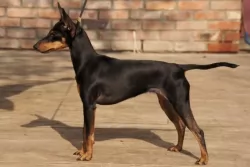 The Manchester Terrier is a small, smooth haired dog with a black and tan coat and a head with a fairly long muzzle, small bright eyes, largish erect ears and a deep chest.
The Manchester Terrier is a small, smooth haired dog with a black and tan coat and a head with a fairly long muzzle, small bright eyes, largish erect ears and a deep chest.
The body is lean and muscular and the tail, where once docked, now tends to be left long. In the toy sized dog you will find him standing at roughly 25 – 30cm in height and he will weigh between 2 to 4kg. The standard sized dog will be slightly taller and heavier and weigh in the region of 8kg.
You can expect between 2 – 4 puppies from a breeding pair.
Feisty, energetic, alert and intelligent are some of the words which describe the Manchester Terrier. Like any other dog, training and socialization will make him a splendid pet, obedient and amicable among people.
He is loving and loyal, courageous and feisty and guaranteed to make you an eager-to-please pet. He can adapt to life in the city or countryside, but is going to need plenty of exercise wherever you keep him as a pet.
 The Basque Shepherd is a strong, well proportioned dog with brown eyes and medium sized ears, which sometimes have folds. This medium-to-large dog has a beautiful fawn coat of medium-length hair that can be straight or slightly wavy. He has a long feathery tail that will wag readily when he sees his owner. You’ll find other colors for the Basque Shepherd shared between the two varieties - a yellow orange or copper coat with other shades being red, blue and black. His hair is shorter on the head and he doesn’t battle with hair over the eyes.
The Basque Shepherd is a strong, well proportioned dog with brown eyes and medium sized ears, which sometimes have folds. This medium-to-large dog has a beautiful fawn coat of medium-length hair that can be straight or slightly wavy. He has a long feathery tail that will wag readily when he sees his owner. You’ll find other colors for the Basque Shepherd shared between the two varieties - a yellow orange or copper coat with other shades being red, blue and black. His hair is shorter on the head and he doesn’t battle with hair over the eyes.
The Basque Shepherd is a highly intelligent dog and also very energetic. Of the two different kinds of Basque Shepherd, it is the Gorbeiakoa which is the more outgoing. The dogs will require a firm owner and they thrive on the discipline when it is combined with lots of with lots of exercise and activities.
The Basque Shepherd is generally friendly with people, if not a little reserved with strangers. He gets on well with children and other pets in the home, although socialization and training will be necessary to bring out their best.
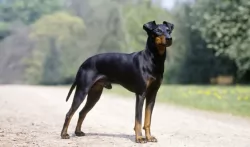 The Manchester Terrier has so many good qualities that make him such a good pet. Low maintenance, he is clean and well groomed to look at. He is also a healthy dog breed, nice and active and low maintenance.
The Manchester Terrier has so many good qualities that make him such a good pet. Low maintenance, he is clean and well groomed to look at. He is also a healthy dog breed, nice and active and low maintenance.
This little dog is willing to come into your home and heart. He will make you a wonderful pet and friend for as long as 15 years if you take special care of him.
 The dog is well suited to being a family pet, loving to spend time with family, being a people-oriented breed. He gets on well with children as well as other pets in the home, but can be reserved with strangers.
The dog is well suited to being a family pet, loving to spend time with family, being a people-oriented breed. He gets on well with children as well as other pets in the home, but can be reserved with strangers.
He doesn’t have an aggressive nature, and yet he does what it takes to protect his beloved human family.
He is full of energy, hardy and tough. He loves his human family and wants to be included in all their activities. He is energetic though and as a responsible dog owner, you want to make sure that your Basque Shepherd has enough space to run.
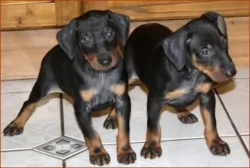 This dog breed is fairly healthy and can reach a good age if looked after well. Every dog though, can be affected by a number of inheritable genetic disorders.
This dog breed is fairly healthy and can reach a good age if looked after well. Every dog though, can be affected by a number of inheritable genetic disorders.
Glaucoma is a common genetic condition in Terrier breeds, including the Manchester Terrier. Secondary glaucoma, which is known as lens luxation is brought about when there is excessive pressure in the eyeball. The lens of the eye is put out of alignment. Most times surgery is the solution.
Von Willebrand's Disease is a blood disorder that affects the clotting process. A dog with this disease will have bleeding gums, continuous bleeding after surgery and sometimes blood in the stool. It’s a disease which can’t be cured but it can be managed with treatments.
 Because this is an ancient breed, the Basque Shepherd doesn’t have to contend with genetic health problems such as more modern breeds. Just like other dogs though, he could be prone to certain conditions such as hip dysplasia, eye problems, ear infections and cancer. As a larger breed, he may also be prone to bloat.
Because this is an ancient breed, the Basque Shepherd doesn’t have to contend with genetic health problems such as more modern breeds. Just like other dogs though, he could be prone to certain conditions such as hip dysplasia, eye problems, ear infections and cancer. As a larger breed, he may also be prone to bloat.
Breeds with floppy ears, such as the Basque Shepherd will be more prone to developing ear infections. To prevent infection, keep his ears clean and dry. If you’re unsure, the vet can guide you how- and what to do.
This is a disease which is common to other dog breeds too and not just the Basque Shepherd. This condition affects the hip joints and can result in chronic pain for the dog and also lameness. Checking your dog’s weight is important and the pain can be managed with medication.
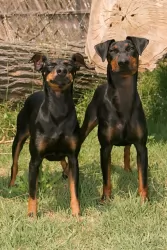 Low maintenance, the Manchester Terrier will only require a brushing once or twice a week. Check his eyes and ears for infections, clip his nails and brush his teeth 2 or 3 times a week.
Low maintenance, the Manchester Terrier will only require a brushing once or twice a week. Check his eyes and ears for infections, clip his nails and brush his teeth 2 or 3 times a week.
The Manchester Terrier is a lean, muscular dog and you want to be sure to keep him that way. If you feed him commercially manufactured food, make sure that it is one of the high quality brands – food which is packed full of vitamins and minerals to ensure the health of your dog.
Any packaged food you buy should be appropriate to the dog’s age and his activity levels. You won’t be doing your dog a favor by feeding him treats that you enjoy such as chocolate, coffee, peanuts, raisins, grapes and onions.
Dogs want simple food that don’t change much. Keeping things simple prevents upset stomachs. Give him some wholesome home-made food occasionally to add into his dry kibble. This can be boiled chicken, brown rice or pasta and some cooked or raw vegetables such as potatoes, carrots and spinach. Some raw meat added in from time to time can also do wonders for your dog. Make sure he has access around the clock to fresh, cool water.
The Manchester Terrier wants lots of exercise, and apart from him having his regular daily walks, he will need runs off the leash in the park. If you go cycling for instance, he will readily run beside you.
 This is a medium to large breed dog and he should therefore be fed a high quality food which has been formulated for medium to large breeds. Because he is a herding dog, you might want to also look at an active-dog or working-breed formula to supply him with that much needed energy.
This is a medium to large breed dog and he should therefore be fed a high quality food which has been formulated for medium to large breeds. Because he is a herding dog, you might want to also look at an active-dog or working-breed formula to supply him with that much needed energy.
The Basque Shepherd’s coat is lush and long with either straight or wavy hair. Regular brush at least twice a week will maintain the coat, get rid of loose hair and prevent fleas.
The Basque Shepherd is an intelligent breed that will respond well to socialization and training. He is a breed that loves sports too because of this very high energy levels. You need to be careful with the Basquae Shepherd around small children, not because he is aggressive in any way, but because he is highly active, and his exuberance and boisterous antics could see him unintentionally knocking over small children.